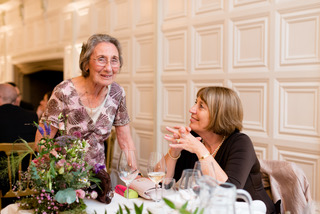- A
- A
- A
Moments of joy for Joyce in music therapy

Joyce Olivia Williams was a woman who loved to dance. As a child, as a young married woman at tea dances with friends, with her daughter Lesley and most recently with her great granddaughters Chloe and Sophia.
Music always meant dancing and joy to Joyce. This was one of the reasons why, when Joyce was living with Alzheimer’s and feeling increasingly confused and isolated as the condition progressed, Music Therapy helped unlock those feelings of joy once again.
This has been movingly captured in a video taken by Music Therapist Richard Trethewey during one of her sessions: http://bit.ly/2pAvlKm.
Joyce’s family, her daughter and grandchildren, want to both spread the word on Music Therapy and to encourage families and carers to request it as part of the care regime for a person living with dementia. They have generously offered to share the video of Joyce with the world to show just how powerful the effect of Music Therapy can be.
They also want to share Joyce’s story of a happy, long and family filled life.
Granddaughter Jennifer Webster said:“Music has a way of bridging the gap, spanning generations in a particular way. For the person living with dementia, and their families, you get to a point when you have to live in the moment, and to live for that moment. The key then is to gather these moments together and turn them into memories, especially for those of us surrounding that person.
“The Music Therapy Nan received, thanks to MHA, helped her live in the moment, giving her peace and happiness at a time when she was often disorientated and troubled. Her therapists also found a way to weave music, and its effects, into her day to day care, which made living with this condition easier for us, and her.
“I wish Music Therapy was more readily available to people living with dementia. Sessions cost £30, which at MHA homes are funded by them. However, fundraising needs to be increased so that more homes can offer this therapy to more people. Dementia is a condition that affects so many of us. It is a part of every community. I would love to see more fundraising happen at a community level, supported by local businesses, who can raise funds for local homes.”
MHA’s Chief Music Therapist Ming Hung Hsu commented: “Joyce’s story really highlights the power music therapy can have on someone living with dementia. We are proud to be able to support many of our residents receiving specialist dementia care with music therapy but really want to be able to offer it to many more.
“All music therapy sessions are provided free of charge to residents and it is only through the generosity of people that we can increase the number of people who can benefit from this vital service.”
Joyce's story
Joyce was born on 19 November 1927, the youngest of four children. Her mother was widowed soon after Joyce’s birth, bringing up her children alone in a ground floor flat in the East End of London.
The East End during the Second World War was a dangerous place to be, and Joyce was evacuated until she was 14, after which she returned to London to work. During this time the family flat – indeed, the whole street – was destroyed during an air raid and Joyce and her family lost everything.
Joyce met her husband Bill, who was posted abroad throughout the War, at a party soon after he was demobbed. They fell in love quickly and married in June 1947. Their only child, Lesley, was born a year later.
The three of them moved out of London in 1955 to Ilford in Essex. They lived there happily for many years, playing, socialising and dancing with their close friends Albert and Doris. However, when Lesley married and moved to Cornwall in 1971, Bill and Joyce soon followed (in 1974).
They remained in Cornwall watching their family grow with the addition of two grandchildren (Jennifer and David) in the 80s and, much more recently, four great grandchildren. The family was close-knit, regularly spending time together at family gatherings and holidays in the UK and the US.
It was not until after Bill’s death in 2011, after nearly 65 years of marriage, that Joyce was diagnosed with Alzheimer’s, although Lesley had noticed symptoms long before that time. In the early stages, Joyce was just forgetful. This meant that the family could manage Joyce’s day to day needs and she remained at home.
However, as the Alzheimer’s progressed, Joyce became increasingly confused. This in turn led to anxiety and isolation, making it harder for both her and her family to cope. Joyce entered MHA’s Langholme home in Falmouth in August 2015, a specialist elderly care facility for people living with dementia.
For some time Joyce was able to return home at weekends to the family, where she continued to dance with her great grandchildren.
However, eventually this also became difficult, and Joyce’s sense of isolation and anxiety grew. Unsure as to what was happening around her, or why, she became increasingly difficult to care for.
Knowing Joyce’s love of dance, and music in general, the team at Langholme suggested Joyce’s anxiety could be alleviated with Music Therapy, which is offered – free of charge - at MHA homes across the UK.
The effect of Music Therapy on Joyce was powerful. During sessions she was transformed, coming alive with the music. The ability of music to “awaken” Joyce’s senses, and fill her with joy, was immediate, and whilst not long lasting, brought peace to her day.
Seeing this effect, the Music Therapy team was able to feed back to family and carers. This meant that they could incorporate singing and dancing into their care of Joyce, making it a happier and easier interaction for all and much improving Joyce’s anxiety.
